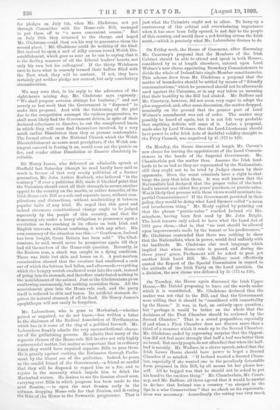On Monday, the House discussed at length Mr. Carson's new
clause for leaving the appointment of the Land Commis- sioners in the hands of the Imperial Government. Mr. Chamberlain put the matter thus. Assume the L•ish land- lords to be as bad as they are represented by the Nationalists, still they ought not to be tried by Judges chosen by their opponents. Even the worst criminals have a right to chal- lenge the jury that tries them. It was well known t'hat the Nationalists had declared that the proper value of the land- lord's interest was either five years' purchase, or prairie-value.. Was it likely that persons with these views would nominate im- partial Commissioners P If the Government persisted in their policy, they would be doing what Lord Spencer called "a mean and treacherous thing." Mr. Healy replied by pointing out that the phrase " prairie-value " reached Ireland vie?, Bir- mingham, having been first used by Mr. John Bright. The Irish tenants only asked to have what the Land Act of 1881 gave them,—that is, that "no rent should be allowed upon improvements made by the tenant or his predecessors.' Mr. Gladstone contended that there was nothing to show that the Nationalists, when in power, would deal unfairly with the landlords. Mr. Gladstone also used language which implied that when Home rule is passed, and during the three years' grace, Parliament will be asked to pass yet another Irish Land Bill. Mr. Balfour most effectively quoted the Report of the Special Commission in regard to the attitude of the Irish Party on the Land question. On a division, the new clause was defeated by 35 (173 to 138).


































 Previous page
Previous page